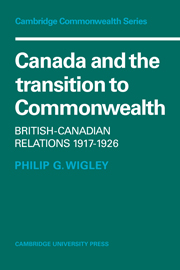Book contents
- Frontmatter
- Contents
- Abbreviations
- Preface
- Introduction
- 1 The threshold of responsibility, 1900–1916
- 2 New departures, 1917–1918
- 3 The settlement of peace, 1919
- 4 Unity and equality, 1919–1921
- 5 The centre cannot hold
- 6 Canadian diplomacy and Imperial diplomacy: 1923
- 7 From Lausanne to Locarno
- 8 The 1926 Imperial Conference: equality defined
- Conclusion
- Bibliography
- Index
7 - From Lausanne to Locarno
Published online by Cambridge University Press: 26 March 2010
- Frontmatter
- Contents
- Abbreviations
- Preface
- Introduction
- 1 The threshold of responsibility, 1900–1916
- 2 New departures, 1917–1918
- 3 The settlement of peace, 1919
- 4 Unity and equality, 1919–1921
- 5 The centre cannot hold
- 6 Canadian diplomacy and Imperial diplomacy: 1923
- 7 From Lausanne to Locarno
- 8 The 1926 Imperial Conference: equality defined
- Conclusion
- Bibliography
- Index
Summary
Different observers of the 1923 Imperial Conference, in accordance with their particular points of view, drew their own conclusions from its proceedings. The Round Table, for instance, went to some lengths to portray the conference as the culmination of what it regarded as a liberal, devolutionary development of imperial relations – a moment when the
system of Imperial cooperation, long regarded as the summum bonum of Imperial attainment, was at last put into full and untrammelled effect … The Conference was a conference of equals … conferring together freely and without reserve … [It] perfected the machinery of the British Commonwealth according to the ideas of the cooperationist school of Imperial thought.
In a similar though less effusive vein Geoffrey Dawson, editor of The Times, could privately assert to N. W. Rowell in Canada that ‘it was one of the best conferences of the kind that has ever been held, for the reason that there was no longer any question at issue about Dominion Status’. Not that the Canadian contingent could be given much credit:
the Prime Ministers really met on an equal and unsuspicious footing, and two of them at all events – Smuts and Bruce – played leading parts in their very different ways. It is impossible to say the same of Mackenzie King, though I liked him personally very much. He seemed to have his exiguous majority … so constantly on his mind that he was reluctant to commit himself to anything which could ever be misrepresented as ‘entanglement’.
- Type
- Chapter
- Information
- Canada and the Transition to CommonwealthBritish-Canadian Relations 1917–1926, pp. 206 - 247Publisher: Cambridge University PressPrint publication year: 1977



